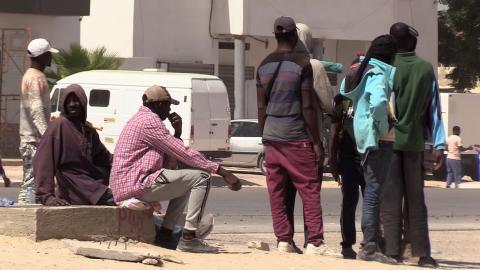Adnan Adams Mohammed
Ghana’s banking sector is to face another crisis if the Bank of Ghana fails with its control measures to avert the downturn consequence of the Domestic Debt Exchange Program (DDEP).
The DDEP has caused many Ghanaian local banks to record huge losses already with further losses expected in coming months. To mitigate this challenge facing the banking sector, the government created a Ghana Stability Fund expecting about US$1.5 billion to ensure appropriate solvency and liquidity.
This, according to Economist at Louisiana Economic Development in the USA, if government is not able to get the funds by July this year, some banks will start collapsing since they will not be able to pay their workers and keep their operations running. Already, some banks have recorded huge losses, therefore the lack of liquidity support from the Stability Fund will leave them with no option than to fold up or reduce their number of branches, which will result in job losses.
“We are heading into a banking crisis, believe it or not, we are currently suffering. If government is not able to get the $1.5 billion Stability Fund by July 2023, some banks will start collapsing”, Dr. Sa-ad Iddrisu alarmed in an interview last week. “Even what is happening in Ghana is affecting the Nigerian economy because a lot of the Nigerian banks in Ghana, are also recording loses.”
The government must speed-up processes in mobilising funds to cushion the banks from this timing canker, he urged.
The Ghana Stability Fund, set up to provide liquidity support to banks participating in a domestic debt exchange and being managed by the Bank of Ghana under unique operational guidelines being developed by the Financial Stability Council, has already secured $250 million from the World Bank in addition to Ghana government’s commitment of $750 million as announced by minister of state for finance Mohammed Amin Adam weeks ago.
Also, a Professor of Economics at the London Business School has warned that banking crises could happen, especially if Central Banks, including that of Ghana, continue to tighten monetary policy.
According to Prof Lucrezia Reichlin, banking crises cannot be prevented in all contingencies, at least not in a fractional reserve system where loans do not need to be fully backed by deposits, like the system of today, adding, the recent crisis is a painful reminder of the fundamental instability of banks’ business model.
Speaking on the topic ‘Early lessons from the recent banking turmoil’ championed by the International Monetary Fund, she expressed hope that banks are well equipped to face generalized liquidity crises through Central Banks’ interventions.
“In principle, we also have tools to deal with the insolvency of a single institution. However, those crises are rarely managed in an orderly way. Today, if the world economy were to plunge into a deep recession, we are likely to see many cases of institutions facing solvency problems that will test this assertion”, she explained.
She added that the Credit Suisse episode rings an alarm on whether Central Banks can be confident that problems can be solved following the rulebook.
“If a bank is failing, the regulator can seek resolution with a bail-in or a bailout. A bail-in in theory is a good option to protect taxpayers, but in some cases a bailout may be wiser. The way to think about the choice is that a bail-in may cause financial instability while a bailout causes moral hazard and is an implicit subsidy to the banking sector”, she continued.
In many cases, she pointed out that the crisis of one bank is addressed by a national regulator facilitating a merger with a national bank, either by moral suasion, subsidy, or both.
This was the case in Switzerland, where UBS was encouraged by the regulator to absorb Credit Suisse at a very unfavorable exchange for Credit Suisse shareholders. Such a solution is not always feasible.
Apparently, the Second Deputy Governor of Bank of Ghana (BoG), Elsie Addo Awadzi, has reiterated that the Ghana’s banking sector remains solvent and strong to support economic growth, despite the recent challenges faced by the country.
She boldly posited that, the banking system is liquid and well positioned to lend to businesses and individuals after government’s debt exchange programme, despite the government’s acknowledgement that the DDEP have had effect on the banking and financial industry.
“Our banking sector remains solvent and liquid even after the pandemic, in the face of recent macroeconomic challenges, and in particular the government debt restructuring efforts”, Mrs Awadzi noted while speaking at the launch of the “Absa SME loan at 10%” in Accra last week.
She explained that the banking sector clean-up and recapitalisation exercise before the onset of the Covcid-19 pandemic, provided the industry with the necessary capital and liquidity buffers to withstand the pandemic and the recent macroeconomic challenges.
“We expect banks over the next few years to take steps to rebuild strong buffers so that they remain resilient for the long-term”, she advised and further pointed out that, while regulating and supervising banks to promote their safety and soundness, the Bank of Ghana expects banks to be more inclusive in their product and service offerings to ensure that all economic actors in Ghana are able to access much-needed finance to grow their businesses and contribute to the growth of our economy.
Meanwhile, a Banking Consultant, Dr. Richmond Atuahene has urged government to engage mining and telecom firms to help mobilise revenue to salvage the imminent danger.
“We need to structure it in such a way that we engage the mining and telcos because they are a cash cow especially some of the telcos. We need to get the inflows to support the sector”.




























